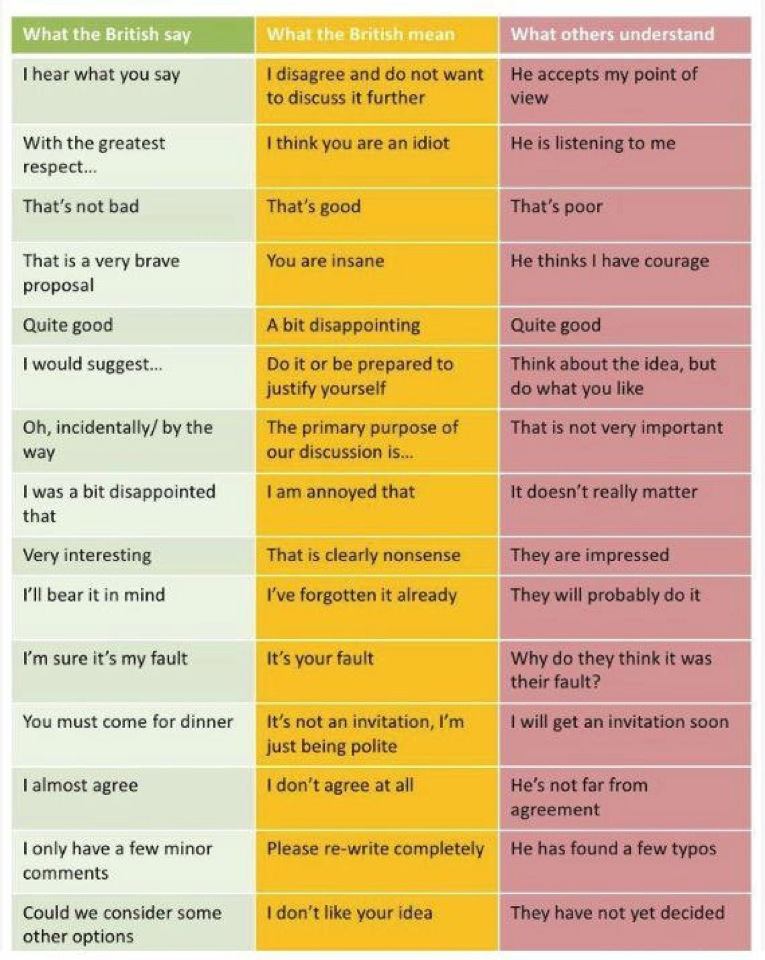Many of us speak English as a first language, we are also fortunate to have members who have English as a second language and the implied different cultures that they bring with them. Our use of the English language is not the same.
When posting on another conversation I remembered a presentation that the managing director (CEO) a the company that I was consulting for had made. The company had just taken over an American company and the managing director was trying to make us British aware that even though we speak the same language - we use it very differently and that our American counterparts may not really understand what we mean. I can’t post his exact slide but the one below (from an unrelated party) is very close.

While browsing the website that I found that image link above on, I saw that there is another somewhat amusing article about the French and English and how we arrived at our distance measurement units here.
I think what’s exposed in the linked article is a very weak (if not flawed) argumentation. For the records I’m not french, english or american.
For the same reason, IMHO the whole discussion about what’s the intended meaning of a sentence is totally undefinable simply basing on the country of the speaker. There are other important variables to keep in account, as for example the mood or how the sentence is pronounced or the actual context of discussion. All these things vary a lot from a country to another, that’s true, but they also vary among regions of the same country and, ultimately among individuals.
Perhaps, the most interesting thing is that english speaking people are doing philosophical disquisition about the language, while the english language is one of the least double meaning languages I know. But that’s just an opinion and, as such, it’s debatable.
Hi Massimo
Very interesting, I think that it only serves to highlight the differences. I only have a few minor comments to make.
The section of my post that you quoted did mention that I found it amusing rather than true or factual. Even the unquoted section stated that ‘our American counterparts may not really understand what we mean’.
In software development we tend to look for and think about logic and binary situations, as humans and of varying cultures I acknowledge that there are many shades of grey and analog rather than digital transitions between them. Everyone’s opinion can be valid and hopefully they help us to reach a better personal understanding.
Btw, the problem is what do you english mean with “amusing”?
One may think since you are amused, you like it and agree on its content
Just joking 
I know, that is the fun of the use of the language. I will give you a clue - I live, across the sea, 78 miles (125 km  ) from France, I visit as often as I can, I have worked with French companies and the French individuals within them and enjoyed every moment. I admire the French and all other cultures that I have had the good fortune to encounter.
) from France, I visit as often as I can, I have worked with French companies and the French individuals within them and enjoyed every moment. I admire the French and all other cultures that I have had the good fortune to encounter.
While we’re at languages, here’s what happens to many people trying to learn Swedish. Putting spaces in a sentence where it “does not belong” results in a sentence meaning a completely different thing.
Quite funny video but it’s totally correct 
Mastering Swedish - Inflections
Wrong: Brun hrig sjuk skterska = Brown hairy sick nurse.
Correct: Brunhrig sjukskterska = Brown haired nurse.
PS. No, English is not my native language 
Talking about Swedish, this is what Germans (probably) understand:
http://www.c303.de/c303-forum/index.php?board=11;action=display;threadid=10199
[quote]Autoreifen Kröte töte
Car tires - To kill a Toad[/quote]


 ) from France, I visit as often as I can, I have worked with French companies and the French individuals within them and enjoyed every moment. I admire the French and all other cultures that I have had the good fortune to encounter.
) from France, I visit as often as I can, I have worked with French companies and the French individuals within them and enjoyed every moment. I admire the French and all other cultures that I have had the good fortune to encounter.